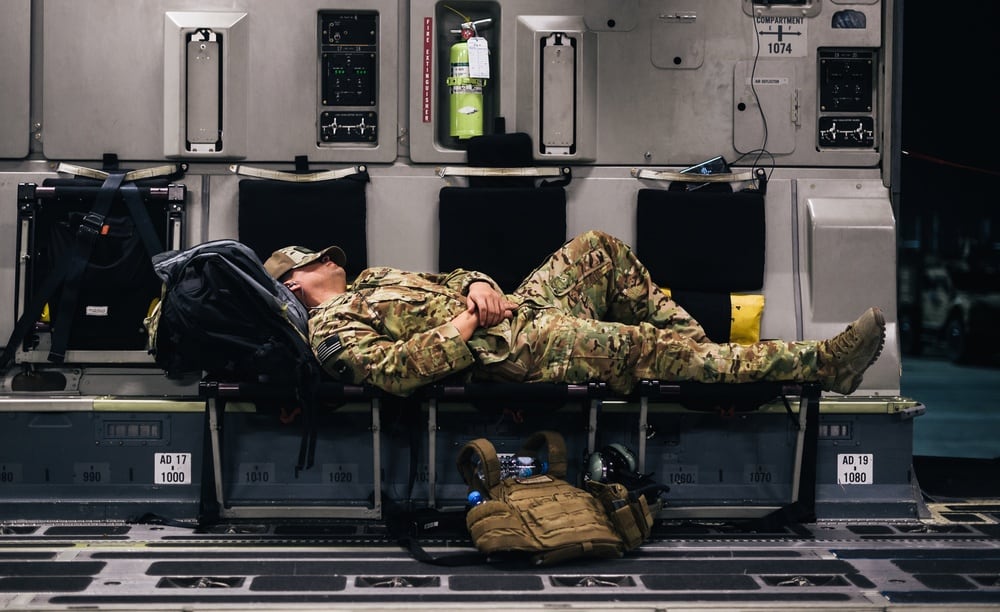In the United States, insufficient sleep is a widespread issue affecting approximately one in three adults, according to the Centers for Disease Control and Prevention. This statistic is even more alarming for post-9/11 veterans.
The latest Warrior Survey from Wounded Warrior Project found that sleep was the top reported health issue among veterans registered with the organization, with 80% reporting sleep problems. Many post-9/11 veterans are having trouble sleeping and staying asleep, and this significantly impacts their quality of life.
Evidence suggests that veterans’ duration of sleep and sleep quality are directly correlated with post-traumatic stress disorder, traumatic brain injury, and other mental and physical health challenges.
The prevalence of these conditions within this generation of veterans highlights the critical role sleep plays in overall wellness. Improving sleep quality is pivotal for enhancing quality of life, given the complex connection between sleep, physical health, and mental wellbeing.
A veteran’s journey through sleep problems
Air Force veteran and nurse Melissa McMahon is no stranger to sleepless nights.
Her sleep problems started when she lifted a fellow service member from a chair and heard a loud pop in her lower back and hips. She worked through the pain and her condition worsened over time.
Melissa experienced partial mobility loss on her left side, persistent backaches, and shifts between fatigue and a longing for sleep. She reached a breaking point when she started experiencing tremors that impacted her ability to provide medicine to patients.
Melissa then received a diagnosis of fibromyalgia — a disorder she learned is trauma-based and characterized by chronic muscle pain, tenderness, fatigue, and sleep disturbances. Her condition forced her to transition to administrative work within the Air Force, which made her feel increasingly isolated.
Coping with her new diagnosis, new role in the military, and physical limitations contributed to feelings of loneliness, depression, and anxiety.
These challenges, combined with poor diet and lack of physical activity and energy, led to extremes in Melissa’s sleep patterns. She either slept too long due to intense fatigue, averaging about 10 to 12 hours per day, or she would not sleep enough, with only a couple hours each night, hampered further by nightmares.
Melissa’s journey mirrors the story of many veterans grappling with the lasting effects of military service. The impact of poor sleep on quality of life has been well documented — affecting mental health and cognitive function and leading to an increase in unhealthy decisions around risky behaviors, diet, and exercise.
Research shows that common comorbid conditions among veterans diagnosed with sleep disorders include obesity, diabetes, congestive heart failure, depression, PTSD, and TBI.
How to support veterans’ sleep challenges
When Melissa realized she was having more bad days than good, she sought help. Through a personalized, multi-week coaching program with WWP’s Physical Health and Wellness team, Melissa identified the factors that hindered quality sleep and the factors that contributed to good sleep.
She recognized the impact of isolation on her mental health, and she addressed her severe depression and anxiety. Melissa adjusted her lifestyle by transforming her nutrition, adopting a well-balanced diet, and significantly increasing her exercise routine from one to two times per week to four to five times per week.
Over the years, her dedication paid off. Melissa gained mental strength, reconnected with peers, and reignited old hobbies, such as swimming and car racing. Most notably, she rediscovered the gift of restful sleep.
Sleep disorders and chronic pain are prevalent in veterans and have historically been viewed as secondary issues. Melissa’s story shows that sleep is complex and often should be viewed as the primary issue.
Sleep is not a singular challenge, nor is there one quick fix. The root causes for poor sleep are often a combination of physical and mental health. Understanding this connection and recognizing the profound impact of sleep on veterans is key to supporting their recovery.
Individualized programs extend a helping hand, guiding veterans like Melissa toward greater overall wellness. By considering the big picture — mental, physical, and social — we can empower warriors to reclaim their well-being, enhance their sleep, and improve their quality of life.
James Herrera is the vice president of Physical Health and Wellness for Wounded Warrior Project. He is an exercise physiologist and former Olympic coach who helps lead the organization’s Soldier Ride, adaptive sports, and health and wellness programs.





